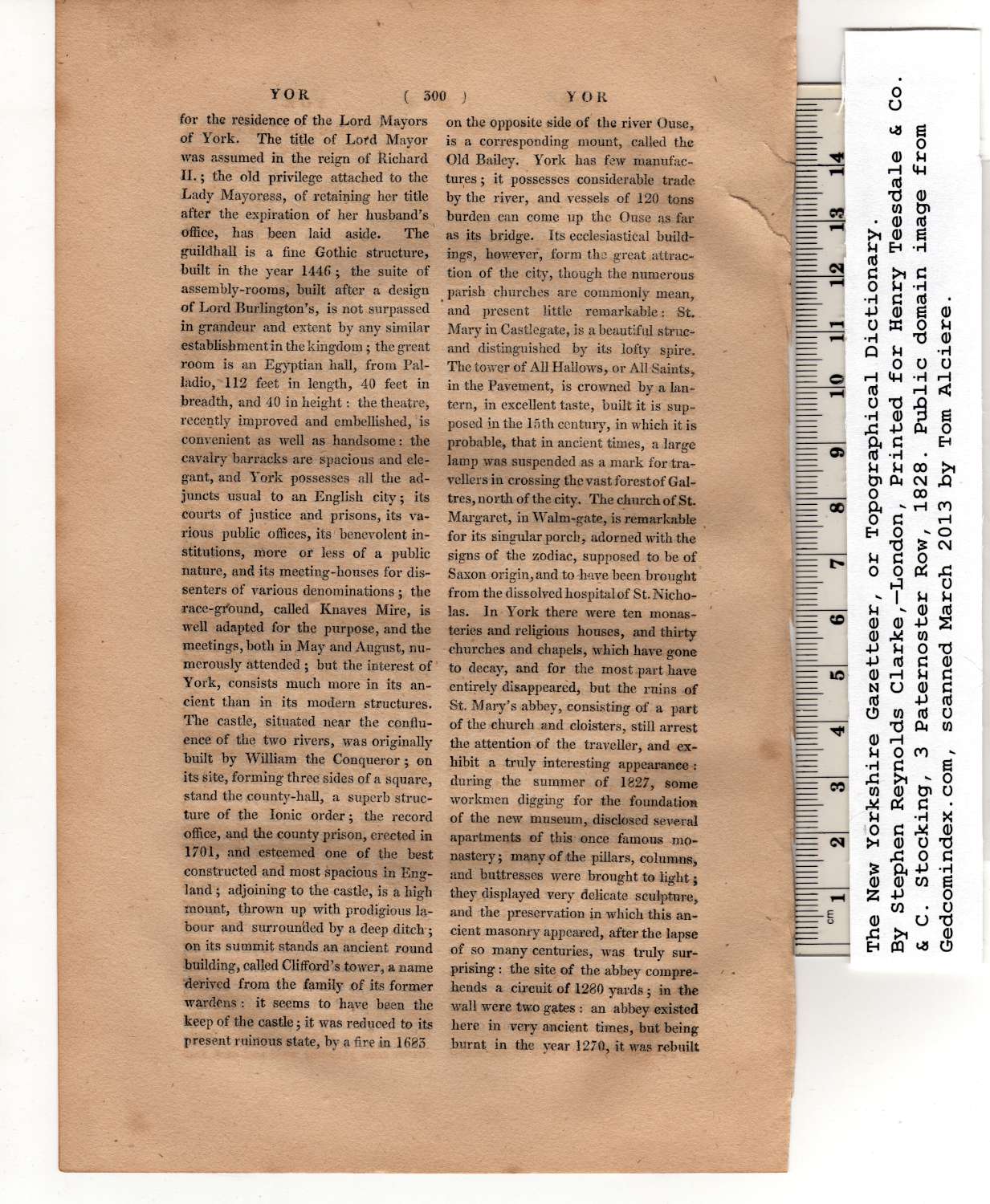|
for the residence of the Lord Mayors
of York. The title of Lord Mayor
was assumed in the reign of Richard |
II.; the old privilege attached to the
Lady Mayoress, of retaining her title
after the expiration of her husband’s
office, has been laid aside. The
guildhall is a fine Gothic structure,
built in the year 1446 ; the suite of
assembly-rooms, built after a design
of Lord Burlington’s, is not surpassed
in grandeur and extent by any similar
establishment in the kingdom; the great
room is an Egyptian hall, from Pal-
ladio, 112 feet in length, 40 feet in
breadth, and 40 in height: the theatre,
recently improved and embellished, is
convenient as well as handsome: the
cavalry barracks are spacious and ele-
gant, and York possesses all the ad-
juncts usual to an English city; its
courts of justice and prisons, its va-
rious public offices, its benevolent in-
stitutions, more or less of a public
nature, and its meeting-houses for dis-
senters of various denominations ; the
race-ground, called Knaves Mire, is
well adapted for the purpose, and the
meetings, both in May and August, nu-
merously attended ; but the interest of
York, consists much more in its an-
cient than in its modern structures.
The castle, situated near the conflu-
ence of the two rivers, was originally
built by William the Conqueror; on
its site, forming three sides of a square,
stand the county-hall, a superb struc-
ture of the Ionic order; the record
office, and the county prison, erected in
1701, and esteemed one of the best
constructed and most spacious in Eng-
land ; adjoining to the castle, is a high
mount, thrown up with prodigious la-
bour and surrounded by a deep ditch ;
on its summit stands an ancient round
building, called Clifford’s tower, a name
derived from the family of its former
wardens : it seems to have been the
keep of the castle; it was reduced to its
present ruinous state, by a fire in 1683
on the opposite side of the river Ouse,
is a corresponding mount, called the
Old Bailey. York has few manufac-
tures; it possesses considerable trade
by the river, and vessels of 120 tons
burden can come up the Ouse as far
as its bridge. Its ecclesiastical build-
ings, however, form the great attrac-
tion of the city, though the numerous
parish churches are commonly mean,
and present little remarkable: St.
Mary in Castlegate, is a beautiful struc-
and distinguished by its lofty spire.
The tower of All Hallows, or All Saints,
in the Pavement, is crowned by a lan-
tern, in excellent taste, built it is sup-
posed in the 15th century, in which it is
probable, that in ancient times, a large
lamp was suspended as a mark for tra-
vellers in crossing the vast forestof Gal-
tres, north of the city. The church of St.
Margaret, in Walm-gate, is remarkable
for its singular porch, adorned with the
signs of the zodiac, supposed to be of
Saxon origin, and to have been brought
from the dissolved hospital of St. Nicho-
las. In York there were ten monas-
teries and religious houses, and thirty
churches and chapels, which have gone
to decay, and for the most part have
entirely disappeared, but the ruins of
St. Mary’s abbey, consisting of a part
of the church and cloisters, still arrest
the attention of the traveller, and ex-
hibit a truly interesting appearance :
during the summer of 1827, some
workmen digging for the foundation
of the new museum, disclosed several
apartments of this once famous mo-
nastery; many of the pillars, columns,
and buttresses were brought to light;
they displayed very delicate sculpture,
and the preservation in which this an-
cient masonry appeared, after the lapse
of so many centuries, was truly sur-
prising : the site of the abbey compre-
hends a circuit of 1280 yards; in the
wall were two gates : an abbey existed
here in very ancient times, but being
burnt in the year 1270, it was rebuilt |
